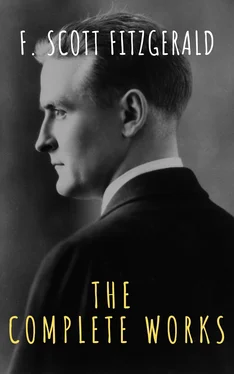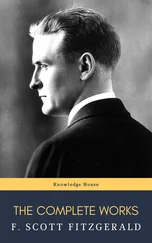The weeks tore by. Amory wandered occasionally to New York on the chance of finding a new shining green auto-bus, that its stick-of-candy glamour might penetrate his disposition. One day he ventured into a stock-company revival of a play whose name was faintly familiar. The curtain rose—he watched casually as a girl entered. A few phrases rang in his ear and touched a faint chord of memory. Where—? When—?
Then he seemed to hear a voice whispering beside him, a very soft, vibrant voice: “Oh, I’m such a poor little fool; do tell me when I do wrong.”
The solution came in a flash and he had a quick, glad memory of Isabelle.
He found a blank space on his programme, and began to scribble rapidly:
“Here in the figured dark I watch once more,
There, with the curtain, roll the years away;
Two years of years—there was an idle day
Of ours, when happy endings didn’t bore
Our unfermented souls; I could adore
Your eager face beside me, wide-eyed, gay,
Smiling a repertoire while the poor play
Reached me as a faint ripple reaches shore.
Yawning and wondering an evening through,
I watch alone … and chatterings, of course,
Spoil the one scene which, somehow, did have charms;
You wept a bit, and I grew sad for you
Right here! Where Mr. X defends divorce
And What’s-Her-Name falls fainting in his arms.”
“Ghosts are such dumb things,” said Alec, “they’re slow-witted. I can always outguess a ghost.”
“How?” asked Tom.
“Well, it depends where. Take a bedroom, for example. If you use any discretion a ghost can never get you in a bedroom.”
“Go on, s’pose you think there’s maybe a ghost in your bedroom—what measures do you take on getting home at night?” demanded Amory, interested.
“Take a stick,” answered Alec, with ponderous reverence, “one about the length of a broom-handle. Now, the first thing to do is to get the room cleared —to do this you rush with your eyes closed into your study and turn on the lights—next, approaching the closet, carefully run the stick in the door three or four times. Then, if nothing happens, you can look in. Always, always run the stick in viciously first— never look first!”
“Of course, that’s the ancient Celtic school,” said Tom gravely.
“Yes—but they usually pray first. Anyway, you use this method to clear the closets and also for behind all doors——”
“And the bed,” Amory suggested.
“Oh, Amory, no!” cried Alec in horror. “That isn’t the way—the bed requires different tactics—let the bed alone, as you value your reason—if there is a ghost in the room and that’s only about a third of the time, it is almost always under the bed.”
“Well—” Amory began.
Alec waved him into silence.
“Of course you never look. You stand in the middle of the floor and before he knows what you’re going to do make a sudden leap for the bed—never walk near the bed; to a ghost your ankle is your most vulnerable part—once in bed, you’re safe; he may lie around under the bed all night, but you’re safe as daylight. If you still have doubts pull the blanket over your head.”
“All that’s very interesting, Tom.”
“Isn’t it?” Alec beamed proudly. “All my own, too—the Sir Oliver Lodge of the new world.”
Amory was enjoying college immensely again. The sense of going forward in a direct, determined line had come back; youth was stirring and shaking out a few new feathers. He had even stored enough surplus energy to sally into a new pose.
“What’s the idea of all this ‘distracted’ stuff, Amory?” asked Alec one day, and then as Amory pretended to be cramped over his book in a daze: “Oh, don’t try to act Burne, the mystic, to me.”
Amory looked up innocently.
“What?”
“What?” mimicked Alec. “Are you trying to read yourself into a rhapsody with—let’s see the book.”
He snatched it; regarded it derisively.
“Well?” said Amory a little stiffly.
“‘The Life of St. Teresa,’” read Alec aloud. “Oh, my gosh!”
“Say, Alec.”
“What?”
“Does it bother you?”
“Does what bother me?”
“My acting dazed and all that?”
“Why, no—of course it doesn’t bother me.”
“Well, then, don’t spoil it. If I enjoy going around telling people guilelessly that I think I’m a genius, let me do it.”
“You’re getting a reputation for being eccentric,” said Alec, laughing, “if that’s what you mean.”
Amory finally prevailed, and Alec agreed to accept his face value in the presence of others if he was allowed rest periods when they were alone; so Amory “ran it out” at a great rate, bringing the most eccentric characters to dinner, wild-eyed grad students, preceptors with strange theories of God and government, to the cynical amazement of the supercilious Cottage Club.
As February became slashed by sun and moved cheerfully into March, Amory went several times to spend week-ends with Monsignor; once he took Burne, with great success, for he took equal pride and delight in displaying them to each other. Monsignor took him several times to see Thornton Hancock, and once or twice to the house of a Mrs. Lawrence, a type of Rome-haunting American whom Amory liked immediately.
Then one day came a letter from Monsignor, which appended an interesting P. S.:
“Do you know,” it ran, “that your third cousin, Clara Page, widowed six months and very poor, is living in Philadelphia? I don’t think you’ve ever met her, but I wish, as a favor to me, you’d go to see her. To my mind, she’s rather a remarkable woman, and just about your age.”
Amory sighed and decided to go, as a favor….
She was immemorial…. Amory wasn’t good enough for Clara, Clara of ripply golden hair, but then no man was. Her goodness was above the prosy morals of the husband-seeker, apart from the dull literature of female virtue.
Sorrow lay lightly around her, and when Amory found her in Philadelphia he thought her steely blue eyes held only happiness; a latent strength, a realism, was brought to its fullest development by the facts that she was compelled to face. She was alone in the world, with two small children, little money, and, worst of all, a host of friends. He saw her that winter in Philadelphia entertaining a houseful of men for an evening, when he knew she had not a servant in the house except the little colored girl guarding the babies overhead. He saw one of the greatest libertines in that city, a man who was habitually drunk and notorious at home and abroad, sitting opposite her for an evening, discussing girls’ boarding-schools with a sort of innocent excitement. What a twist Clara had to her mind! She could make fascinating and almost brilliant conversation out of the thinnest air that ever floated through a drawing-room.
The idea that the girl was poverty-stricken had appealed to Amory’s sense of situation. He arrived in Philadelphia expecting to be told that 921 Ark Street was in a miserable lane of hovels. He was even disappointed when it proved to be nothing of the sort. It was an old house that had been in her husband’s family for years. An elderly aunt, who objected to having it sold, had put ten years’ taxes with a lawyer and pranced off to Honolulu, leaving Clara to struggle with the heating-problem as best she could. So no wild-haired woman with a hungry baby at her breast and a sad Amelia-like look greeted him. Instead, Amory would have thought from his reception that she had not a care in the world.
Читать дальше












